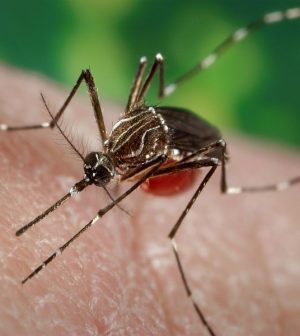- 10 Strategies to Overcome Insomnia
- Could Artificial Sweeteners Be Aging the Brain Faster?
- Techniques for Soothing Your Nervous System
- Does the Water in Your House Smell Funny? Here’s Why
- Can a Daily Dose of Apple Cider Vinegar Actually Aid Weight Loss?
- 6 Health Beverages That Can Actually Spike Your Blood Sugar
- Treatment Options for Social Anxiety Disorder
- Understanding the Connection Between Anxiety and Depression
- How Daily Prunes Can Influence Cholesterol and Inflammation
- When to Take B12 for Better Absorption and Energy
Dengue Virus Makes Mosquitoes Bite More Often

New research shows that mosquitoes infected with the dengue virus bite more often, which triples the risk of transmitting the disease to people.
Dengue is one of the most common mosquito-borne diseases. It affects more than 400 million people each year worldwide, killing around 40,000.
Most infected people have no symptoms or mild ones such as nausea, vomiting, rash, fever and aches and pains. However, 1 in 20 infected people develops severe dengue, which can lead to shock, internal bleeding and death.
In this lab study, researchers used high-resolution video to observe the blood-feeding behavior of dengue-infected and non-infected mosquitoes using mice. The videos were then analyzed using computer software.
“We found that the dengue virus increases mosquito attraction to the mammalian host and the number of mosquito bites,” said study senior co-author Ashley St. John, an associate professor in the Emerging Infectious Diseases Program at Duke-NUS Medical School Singapore.
“The higher attraction to the mammalian host increases the chances of the mosquito to bite, while more bites increase the number of transmission events because each bite results in the transmission of the virus,” St. John explained in a Duke news release.
“This sheds new light on the many ways the virus hijacks its vector to be transmitted,” said study senior author Julien Pompon, a scientist and group leader at French Research Institute for Sustainable Development.
The results were published Jan. 18 in the Proceedings of the National Academy of Sciences. Animal research does not always pan out in humans.
Currently, there is no way to control dengue.
“The study will help advance our understanding of the epidemiology of dengue and better tailor disease control strategies,” Pompon said in the release.
The researchers want to learn more about what causes the changes in feeding behavior in dengue-infected mosquitoes. If they can pinpoint a gene or protein responsible for the changes, they said it might be possible to create chemicals that target them.
More information
For more on dengue, see the World Health Organization.
SOURCE: Duke-NUS Medical School Singapore, news release, Jan. 13, 2022
Source: HealthDay
Copyright © 2026 HealthDay. All rights reserved.










